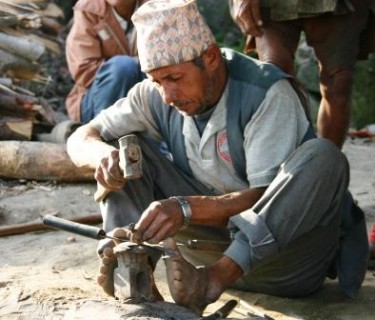How discriminatory was the first Muluki Ain against Dalits?
Sujit Mainali / August 21, 2015
Talking on the radio program “Naya Nepal” on the BBC Nepali Service on 30 July, 2015, Jit bahadur (Darji) Gautam, a Dalit member of the Constituent Assembly representing the second largest party CPN-UML said:
We all regard the Muluki Ain (General Code) of 1854 as the first law of Nepal….This law encouraged casteism…restricted the entry of (Dalits) in all sectors of the state, did not allow them to walk on the street, eat good food…
Click here to listen to the interview:
- Is the Muluki Ain-1854 the first law of Nepal?
Muluki Ain is not the first law of Nepal. But it is the first among the available written laws of Nepal.
- Did the Muluki Ain promote casteism [untouchability]?
Untouchability based on casteism was practiced in Nepali society even before the promulgation of the General Code-1854. This code recognized and legalized untouchability based on casteism.
The code legalized the caste-based social hierarchy.
The code categorized people into five major groups: Tagadhari (those wearing the sacred thread called Janai across their torso), Masinay Matuwali (enslavable liquor drinkers), Namasine Matuwali (unenslavable liquor drinkers), Pani Nachalne Chhoichhito Halnu Naparne (Impure but touchables including foreigners, Muslims and Christians also fall under this category), and Pani Nachalne Chhoi Chhito Halnu Parne (Impure and Untouchable, upon touching whom one needed to purify themselves by sprinkling gold-dipped water).
According to the code, individuals of different caste groups were subjected to different punishments for the same crime. Based on this fact, the claim that the code encouraged casteism (untouchability) is true.
Here are some examples which further show as to how hostile the code was against the Dalits and how it encouraged untouchability:
If an Upadhyaya Brahman (Brahman of highest status) ejaculated his semen in the mouth of someone else’s wife or made her swallow his semen ejaculated elsewhere, the punishment for him would vary based on the caste of the victim woman.
| Caste of the victim | Fine |
| Upadhyaya Brahman | Rs 500 |
| Rajput, Jaisi | Rs 450 |
| Sacred thread wearer chhetri | Rs 400 |
| Non-enslavable liquor drinker | Rs 250 |
| Enslavable liquor drinker | Rs 200 |
| Impure but touchable | Rs 150 |
| Impure and untouchable (Achhut) | Rs 100 |
If a man from the lowest caste group i.e. Impure and Untouchable, ejaculated semen in the mouth of the wife of someone from higher caste than his or made her swallow his semen ejaculated elsewhere, the man is subjected to enslavement. But if the victim is also from impure and untouchable caste, then the perpetrator is subjected to a fine of Rs 100. (pg 262)
The code has provisioned separate punishments for those who spit in the mouth of another person, based on the caste of the victims and the perpetrators. Here are some examples of such provisions:
- If a Brahman spits in the mouth of a person from Rajput (sacred thread wearing) caste, he is subjected to a fine of Rs 5. If the Brahman perpetrator’s victims are from Non-enslavable Liquor Drinker caste and Enslavable Liquor Drinker caste, then the fine is Rs 2 and Re 1 respectively. But if the victim is from Impure and Untouchable caste, then the code states that the Brahman perpetrator is subjected to punishment (there is no mention of fine).
- If a Rajput spits in the mouth of a person from higher caste, the perpetrator is subjected to a fine of Rs 7.
- If a person spits in the mouth of another person of the same caste as his, the perpetrator is subjected to a fine of Rs 5.
- If a person from Impure Caste spits in the mouth of a person from higher caste, he is subjected to a fine of Rs 20. (pg 264)
The punishment for a person found guilty of premeditated murder is as follows:
- If a person from Upadhyaya Brahman, Jaisi Brahman, Bhatta Deshi Brahman of Tirahut [the area to the north of Ganges in Bihar, India] murdered a person, the murderer’s entire property would be confiscated [by the state] and he would be branded using a hot metal with three Nepali letters da ma la as a mark of shame. (According to Brihat Nepali Shabdakosh [a Nepali dictionary], Damal sometimes also involved cutting the hair of a person from four sides to shame him/her. This form of punishment was in practice during the pre-1951 Rana rule in Nepal).
- If the murderer is from Rajput or Chhetri or Liquor Drinking or Shudra castes then he gets capital punishment. (pg 267)
Some more provisions of the Muluki Ain-1854 that promoted casteism and untouchability are as follows:
- If the foodgrain touched by a Christian, Muslim, Kami (blacksmith), Sarki (cobbler), Damai (tailor) and people from the Impure and Untouchable caste is not steamed or roasted such foodgrain is not impure. Ground, husked or shelled foodgrain even if touched by the aforementioned people does not become impure.
- Raw meat and fish untouched by water, tobacco, perfume, rose water, spices, and fruits with pleasant aroma do not become impure even if they are touched by a Christian, Muslim, blacksmith, cobbler, tailor and a person from the Impure and Untouchable caste. The aforementioned food items can be eaten by sitting separately from the aforementioned persons.
- If a person from Impure and Untouchable caste touches an earthen pot containing water, then the pot becomes impure. But if the earthen pot touched by the aforementioned persons has not touched water then the pot remains pure. If the aforementioned persons have touched pots made of wood or china or glass, then the pots become pure once they are washed and dried. (pg 352)
- If a person has witnessed that water or any food item containing water has been touched by someone from Impure and Untouchable caste or by a pig, but reveals the fact only after someone from sacred thread wearing caste has consumed that impure water or food, then the man sitting on the truth shall be subjected to a fine of Rs 10. The person who consumed such food will become pure after undergoing a repentance ritual (Godan and Prayschit). (pg 252)
- Has the Muluki Ain-1854 restricted Dalit in all sectors of state?
The Muluki Ain has not mentioned that the Dalits will be restricted in any sectors of the state.
- Has the Muluki Ain-1854 barred Dalits from walking on the street or eating good food?
The Muluki Ain has not mentioned that the Dalits are not allowed to walk on the street or eat good food.
On the contrary, it has restricted the Sacred Thread Wearers including Brahman, Rajput, Jaisi and Chhetri people from consuming alcohol and fermented and distilled herbs and fruit beverages. (pg 357)
Also, the code has restricted Upadhyaya Brahmans [the highest among Brahmans] from consuming duck meat. (pg 357)
(Full text of the Muluki Ain-1854 provided by the Nepal Law Commission is the main reference in this article).
This material is copyrighted but may be used for any purpose by giving due credit to southasiacheck.org.
Comments
Latest Stories
- In Public Interest Covid-19 cases are low, but that’s not an excuse to avoid vaccination
- In Public Interest What is BF.7, the sub-variant that has the world by its grip?
- In Public Interest Threat of a new Covid-19 wave looms large amid vaccine shortage in Nepal
- In Public Interest As cases decline, Covid-19 test centres in Kathmandu are desolate lot
- In Public Interest Dengue test fee disparity has patients wondering if they’re being cheated
- In Public Interest As dengue rages on, confusion galore about what it is and what its symptoms are. Here’s what you need to know
In Public Interest
 Covid-19 cases are low, but that’s not an excuse to avoid vaccination
The Pfizer-BioNTech bivalent vaccines authorised by the Nepal Government provide better protection a...
Read More
Covid-19 cases are low, but that’s not an excuse to avoid vaccination
The Pfizer-BioNTech bivalent vaccines authorised by the Nepal Government provide better protection a...
Read More
- What is BF.7, the sub-variant that has the world by its grip?
- Threat of a new Covid-19 wave looms large amid vaccine shortage in Nepal
- As cases decline, Covid-19 test centres in Kathmandu are desolate lot
- Dengue test fee disparity has patients wondering if they’re being cheated
- As dengue rages on, confusion galore about what it is and what its symptoms are. Here’s what you need to know
